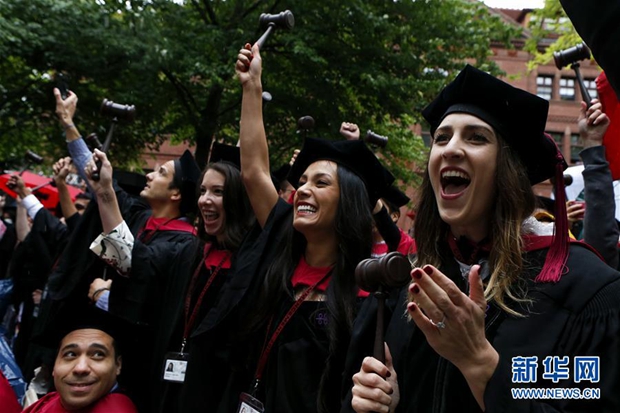?Harvard causing 'brain drain' through discrimination against Asians
- By Sumantra Maitra
 0 Comment(s)
0 Comment(s) Print
Print E-mail China.org.cn, July 1, 2018
E-mail China.org.cn, July 1, 2018

Of all of the baffling but predictable news of the last few weeks, Harvard's discrimination against Asians stands out. According to a new report that has created a significant stir, Harvard admissions officers have consistently rated Asian-American applicants on personal qualities, compared to students of other ethnic backgrounds. A study conducted by a Duke University economics professor, citing 20 years of data, clarified this finding. The study found that from 2000 to the current year, Asians had the lowest admission rate of all racial groups. Put simply, Asian students scoring high on admission tests and intelligence were discriminated against arbitrarily for qualities such as shyness and social awkwardness.
Surprisingly, this was discovered not long ago by Harvard's own internal process, which then tried to cover it up. A group of Asian-American students filed a lawsuit against the institution for its discrimination, and the Students for Fair Admissions organization joined in. Harvard wanted to keep the records hidden, but was court-ordered to publish everything. This is incredible to believe, but is a symptom of the sort of discrimination against hardworking male Asian students that is becoming increasingly common in the United States.
For example, an Asian male, according to the study, who is from a stable economic background, regardless of his merit, test results, or aptitude, would have a 25 percent chance of getting in. Meanwhile, coming from a similar or more disadvantaged background, the chances would be 77 percent for a Hispanic student, and a whopping 95 percent for an African or African-American student. The reason is that Harvard has a holistic admission process, which means that admissions doesn't care about actual merit only. It also cares about racial backgrounds and personalities, which are arbitrarily defined.
So an Indian, Korean, Chinese or Japanese student who studies hard, but is overall shy and studious compared to other students, will not get into Harvard's system. This discrimination has of course had adverse effects on admission. Harvard's Asian-American representation for the last two decades has remained between 20 to 22 percent, which is illogical given that if only academics were a factor, Asians would be around 50 percent of total Harvard students. Harvard has naturally disagreed with the study, and said that it is intentional harassment, and that it is Harvard's right to decide on a holistic approach so that there's a more diverse student body.
This comes at a time when American polity is ripping itself apart on race, migration and resistance to the central administration. The special treatment of Hispanics by the previous administration resulted in increasing migration from Latin America, which resulted in a severe backlash leading to Trump's win. The fabric of race is heavily woven into the American body politic and is more complicated than it seems. This is just one example. Asians are considered the model minority. South Asian or Indian-Americans are the most successful minority group, and Asian-Americans score over any other minority groups in the U.S. based on academic performance. However, they have always been the most discriminated against.
During the 1992 L.A. race riots, Korean shopkeepers had to defend their shops from gangs, and this has been repeated during protests associated with Black Lives Matter. People of Chinese heritage and many Chinese academics cannot take part in joint projects due to fear of spying. And Indians are routinely discriminated against during visa programs for jobs in the tech sector. These effects are only increasing as society gets more polarized and violence erupts. Now institutions, which are supposed to be arbiters of merit, are discriminating against people who are more successful and conservative, come from stable families and have a better work ethic. In simple words, Asians work hard, and come from a competitive culture which prefers success, and their hard work is being punished.
In an ironic way, this is deserved. It is baffling why other countries cannot produce and provide an alternative place for these brilliant students and researchers, who are frustrated by discrimination and quotas, whether in Silicon Valley or the tech industries. But ultimately, if this continues, there will result a massive brain drain from United States institutions, and that spells a gain for any other institutions that respects hard work, a competitive spirit, ethics and merit, and nothing else.
Sumantra Maitra is a columnist with China.org.cn. For more information please visit:
http://www.ccgp-fushun.com/opinion/SumantraMaitra.htm
Opinion articles reflect the views of their authors only, not necessarily those of China.org.cn.





